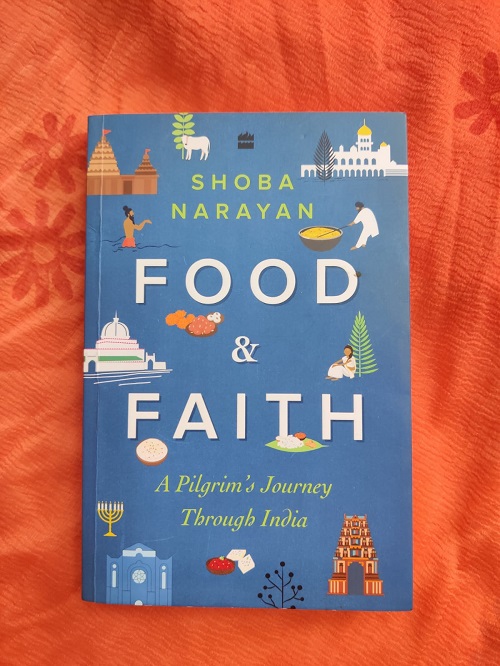A scrumptious offering of anecdotes and stories about sacred food, interesting places and people.
Every time I come across Shoba Narayan’s name, I think of palak paneer.
No, it is not because I referred to her palak paneer recipe and got stellar results in the kitchen. And no, I was not in some restaurant enjoying a nice plate of palak paneer when I met her for the first time (although it would be really nice to chat with her over a meal). It is because of her award-winning essay God of Small Feasts which I have read multiple times. In the essay, Shoba Narayan writes about the time when she cooked a full-fledged feast for her family; a litmus test turns out that her family had posed to see if she could travel alone and sustain herself in the United States of America. Palak paneer is the ‘misfit’ dish that she adds to her south Indian spread to say that not only can I sustain myself, I can do a lot more.
In God of Small Feasts, the people and the food came to life, and I could almost picture a bubbling pot of rasam and a boisterous family seated in front of banana leaves waiting for the food. Shoba Narayan had the same effect on me when I finished reading her latest book, Food & Faith; A Pilgrim’s Journey Through India. As we travel with her to Kashi, Udipi, Jaipur, Nepal, Goa, Ajmer and more places feasting on some kesaria bhaat, unniappam, panchamritam, paal payasam and the traditional Jewish halwa, among other delicacies, we gain front row seats to these places, observing the people inhabiting them and the foods occupying their sacred kitchens.
Between the pages of Food & Faith, the author takes on many roles. We hear from Shoba – the sceptic, the believer, the travel writer, the food writer, the historian, the observer and the storyteller. As she switches between these different personas, she still manages to keep the narrative seamless, and before you know it, you are making travel plans in your head. The author digs into historical accounts while juxtaposing her views on the relevance of some of these practices in today’s world, leaving us with enough food for thought.
Interesting incidents and anecdotes add a dash of humour every now and then, reminding us that we are not just talking about places of reverence but also bustling cities and towns where lives go about as usual. In Palani, for example, the author encounters Muniamma, who asks her if she could be one of the extras in her grandson’s video to protest garbage dumping in a local lake. The video does not come through and the author poignantly captures the incident by writing- “For the locals of Palani, life isn’t only about god and godliness, although many make a living from Him or Her and the temples that they inhabit. But their life is also about motorbikes or motors that break down, breakout YouTube videos that they want to shoot and women they want to woo.“
Food & Faith discusses food that defines these places going beyond the religious offerings. In Udipi, we also hear about the masala dosa; in Palani, the author takes a quick detour in the midst of the Muniamma tale to talk about barnyard millets, and in Kashi, we indulge in some kachoris and jalebis. The book also gently reminds us that many of these traditional practices were and are rooted in conservation. Local and seasonal ingredients naturally make their way into the prasad or the offering, while in places like Puri, the food cooked in the temple’s sacred kitchen also promotes the preservation of indigenous rice varieties. As these recipes become occasional entries in our personal culinary diaries, we seem to be losing more than a set of instructions for traditional foods.
Food & Faith; A Pilgrim’s Journey Through India comes to us at an interesting time. In the past one and a half years, we have turned to faith in hopes that we will make it through this inexplicable period of our lives. We have also turned to food for some solace. Some of us are praying a lot more, and some, baking a lot more. Some of us are doing a little bit of both, while some of us are doing neither. But no matter how we choose to make sense of what the world has become, it is okay. And that is the message that you are left with when you finish this journey with the author. It really is all okay.
For more information visit: shobanarayan.com
